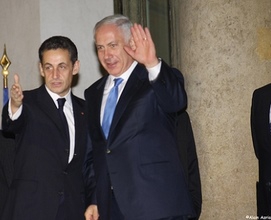|
World Jewish News

Benjamin Netanyahu and Nicolas Sarkozy photo by 7kanal
|
Netanyahu: Syria dropping Golan condition for talks
08.12.2009, Israel and the World Syria is now willing to negotiate without preconditions, having retracted its earlier insistence that talks could not begin unless Israel first agreed to withdraw from the entire Golan Heights, Prime Minister Benjamin Netanyahu told the Knesset Foreign Affairs and Defense Committee on Monday.
Briefing the committee on the indirect feelers to Syria that he put out several weeks ago via French President Nicolas Sarkozy, Netanyahu said Damascus initially insisted on this precondition.
"But when I met with Sarkozy [last month], he told me the Syrians are ready to waive this precondition but do not want to negotiate directly, only via a mediator," Netanyahu said. "I replied to Sarkozy, 'I prefer direct negotiations, but if the Syrians want mediation, you mediate.'"
Sarkozy, the premier continued, said the Syrians prefer Turkish mediation. But Netanyahu responded that an "honest broker" is needed, and he is "not certain" the Turks fit the bill given their behavior since Israel's war in Gaza nearly a year ago.
Moving on to Lebanon, Netanyahu said that "today Hezbollah is the real Lebanese Army," and the Lebanese government will therefore be held responsible for any Hezbollah attack on Israel.
Meanwhile, Israel is working with the United Nations to try to complete an Israel Defense Forces withdrawal from the northern half of the village of Ghajar before Italian General Claudio Graziano steps down as head of UNIFIL, the UN Interim Force in Lebanon. Graziano is scheduled to leave his post at the end of January.
The Israeli-Lebanese border runs right through Ghajar. Israel occupied the village's northern half during the Second Lebanon War in 2006 and has refused to leave without security arrangements that would prevent Hezbollah from using northern Ghajar as a staging ground for attacks.
Under Graziano's proposal, which Israel has accepted, UNIFIL would have sole responsibility for security in northern Ghajar once the IDF withdraws; no Lebanese Army troops would enter it.
However, Israel would retain responsibility for civilian services such as education and health care in both halves of the village.
By Jonathan Lis and Barak Ravid
Haaretz.com
|
|
